8156048667_f21d9e79f4_k-Photo-by-filckr-user-Cowgirl-Jules1200-web
Do you have any thoughts on this post?
This Congress continues to show an appetite for boosting outdoor recreation opportunities on lands open to all Americans
After a historic win for public lands across the U.S. in March—we’re talking, of course, about the milestone package of legislation that permanently reauthorized the Land and Water Conservation Fund and made many other improvements that benefit hunters and anglers—conservation and access advocates aren’t resting on their laurels. And Congress continues to show an appetite for passing commonsense legislation that boosts access, habitat, or funding for fish and wildlife resources, even with an incredible amount of to-dos lined up to distract them.
Here are five bills on the move that you should know about.
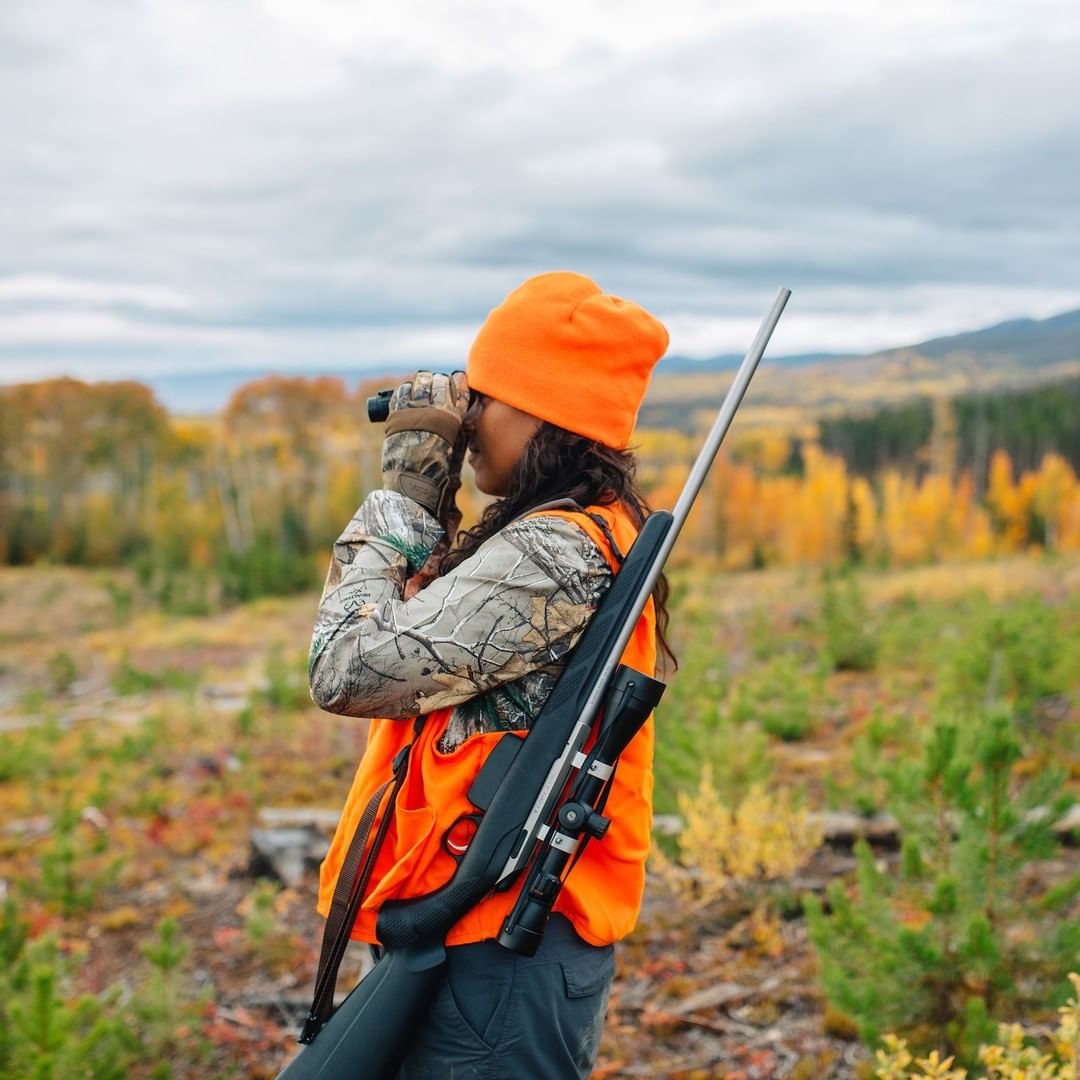
The CORE Act would safeguard approximately 400,000 acres of Colorado’s most rugged landscapes that define an outdoor way of life—particularly the sprawling Thompson Divide, where thousands of hunters pursue elk each year. Roughly half of the area is roadless and provides refuge for abundant fish and wildlife populations. The bill, which has benefited from the input and the support of a long list of diverse stakeholders, including sportsmen and women and business leaders, passed out of committee in July and succeeded in a 227-182 vote on the House floor this week.
Next step: The Senate Energy and Natural Resources Committee should move forward with a legislative hearing on the CORE Act in the near future.
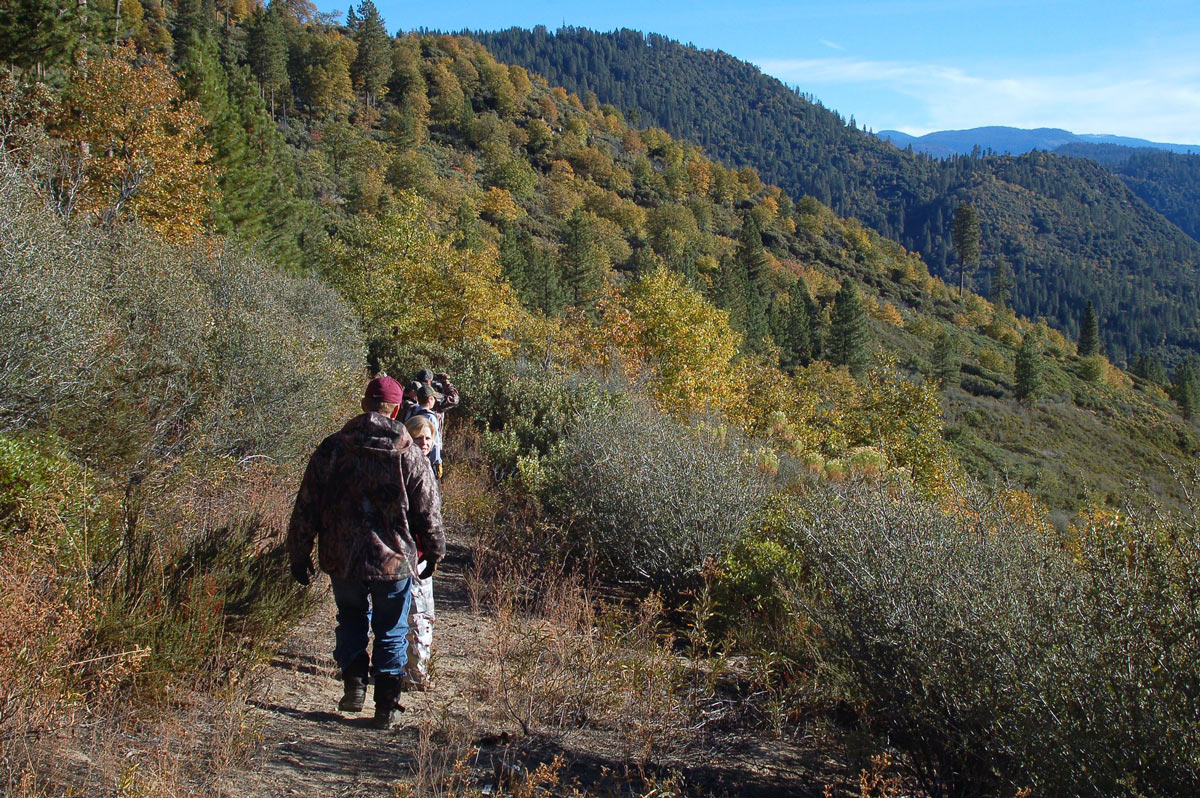
Across our nation’s public lands, hunters, anglers, guides, and outfitters find legal access difficult, but not always because of closed gates or lack of trails: A complicated and outmoded process for permitting outdoor recreation activities on public lands can keep kayaks in storage and guide vehicles stuck in park.
Supported by the TRCP and championed by partners like the Outdoor Recreation Roundtable, the Outdoor Industry Association, and others, the Recreation Not Red-Tape Act seeks to improve access to public lands by modernizing the process of permitting for certain kinds of outdoor recreation—including by bringing that process online—and creating a system of National Recreation Areas. It would also help prioritize access improvements that benefit military veterans and emphasizes the need for adequate staffing of facilities on our public lands. Expert witnesses from the outdoor recreation industry testified in support of the RNR Act in both a House Small Business Committee hearing and a Senate Energy and Natural Resources hearing this week.
Next step: The Senate Energy and Natural Resources Committee can now move forward with passage. In the House, the legislation has been referred to multiple committees, and an agreement should be reached by leadership to move this important and bipartisan legislation forward to the floor.
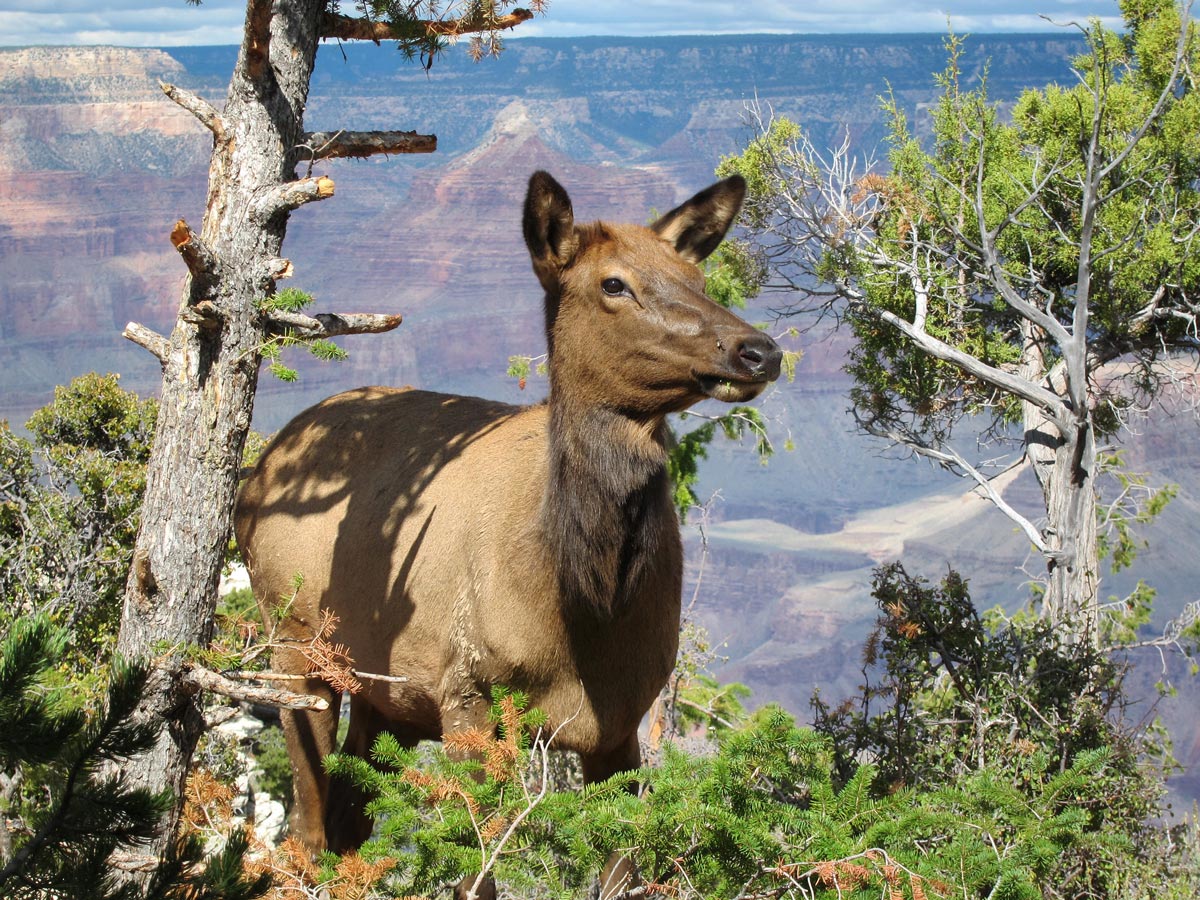
Passed on the House floor this week with a bipartisan vote count, this bill would make permanent the 20-year mining withdrawals that were made administratively in 2012, aimed at protecting the lands around Grand Canyon National Park from uranium mining. In a place that has long been associated with Theodore Roosevelt and is one of the most iconic landscapes in all the world, uranium mining poses an unacceptable risk to the region’s air and water quality, fish and wildlife habitat, and critically important outdoor economy. H.R. 1373 has been a longtime priority of Arizona sportsmen and women.
Next step: The House passed the legislation this week by a vote of 236-185, and while there is not a Senate companion at this point, the legislation should be made a priority in that chamber, as well.
“The Grand Canyon fills me with awe. It is beyond comparison–beyond description; absolutely unparalleled throughout the wide world… Let this great wonder of nature remain as it now is. Do nothing to mar its grandeur, sublimity and loveliness. You cannot improve on it.” – Theodore Roosevelt, 1903
Similar to the Recreation Not Red-Tape Act, the SOAR Act is supported by businesses and nonprofits across the industry and would help ensure the continued growth of the $887-billion outdoor recreation economy by further improving and modernizing the recreational permitting process on public lands.
The legislation reauthorizes the permitting authority of the BLM and Forest Service, and it brings the Fish and Wildlife Service and Bureau of Reclamation under the authority of the Federal Lands Recreation Enhancement Act, allowing those agencies to retain and reinvest permit fees. Importantly, the bill also allows agencies to issue a single permit when a trip crosses an agency boundary, a significant improvement over current policy which requires multiple permits for the same trip.
S.1665 was also included in this week’s Senate Energy and Natural Resources hearing, which featured testimony from leaders of the Forest Service, Bureau of Land Management, education and research initiatives, and the ski industry.
Next step: With hearings complete, it is time for both the House and Senate Committees to move this bill forward for floor votes.
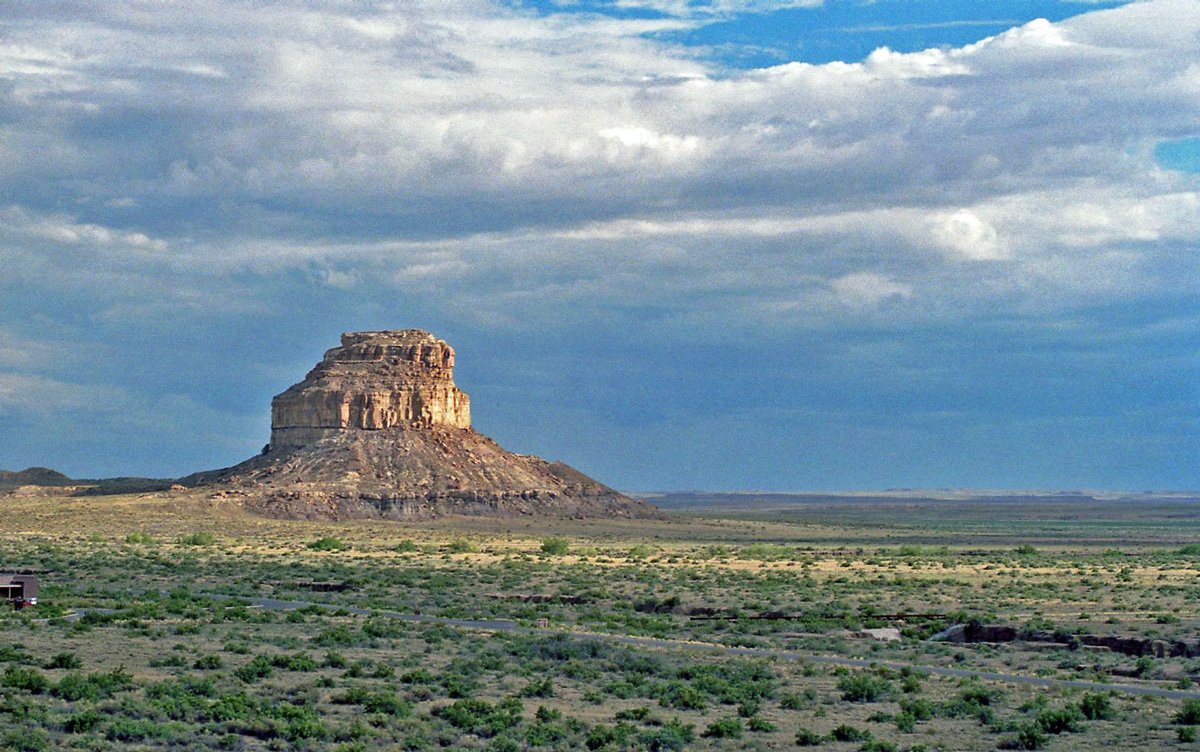
Another effort to balance demands on public lands from energy development, this House bill would protect areas around Chaco Canyon—a world heritage site known for its archaeological significance and cultural importance—from oil and gas development. The legislation would make permanent a current administrative deferral of oil and gas leasing instituted by Interior Secretary David Bernhardt earlier this year. It was passed in a bipartisan 245–174 vote on the House floor this week. Besides the buildings and sacred dwellings still standing from the 9th, 10th, and 11th centuries, Chaco Canyon is also home to pronghorn antelope and mule deer.
Next step: A Senate companion bill was introduced and debated in committee early this year. That will have to move to successful floor consideration in the Senate before these can be conferenced, likely as part of a bigger comprehensive public lands package.
Top photo by Tom Koerner/USFWS.
A volunteer effort in Nevada highlights the commitment of wildlife managers and conservationists
Of all the big game species in North America, bighorn sheep hold a special place in the hearts—and dreams—of many hunters. But these animals have been struggling for generations due to a number of factors, such as habitat loss and disease.
Wild sheep conservation sometimes depends on reintroducing these animals to their historic ranges and ensuring that they are healthy once they arrive. In Nevada, there has been tremendous success by the Nevada Department of Wildlife and groups such as Nevada Bighorns Unlimited, Elko Bighorns Unlimited, Fraternity of the Desert Bighorn, and the Wild Sheep Foundation. As a result, our state’s sheep have become a valuable resource for repopulating other areas of the West, growing new herds and pushing back against the many challenges faced by bighorns.
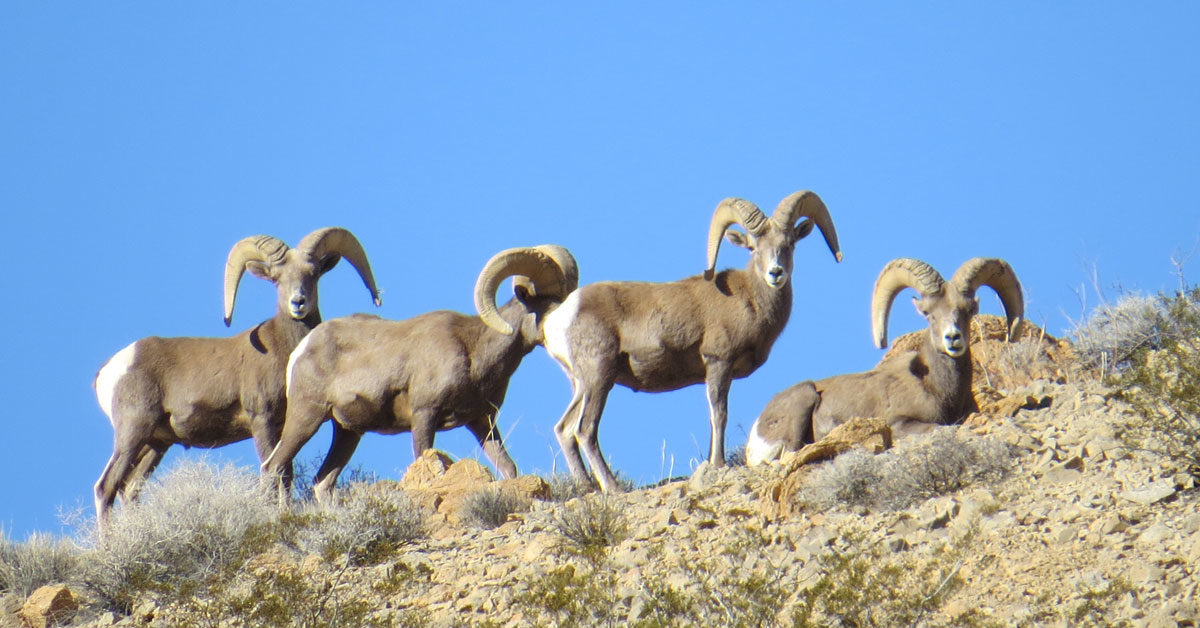
Last week I helped out on a desert bighorn sheep capture project in the Stillwater Mountains (Unit 044/182) of western Nevada. The animals we captured were transported to Utah for release into the Mineral Mountains near Beaver, in the west-central part of the state.
Folks onsite included a lot of staff from the Nevada Department of Wildlife and Utah Division of Wildlife Resources, plus several volunteers, including two state wildlife commissioners.
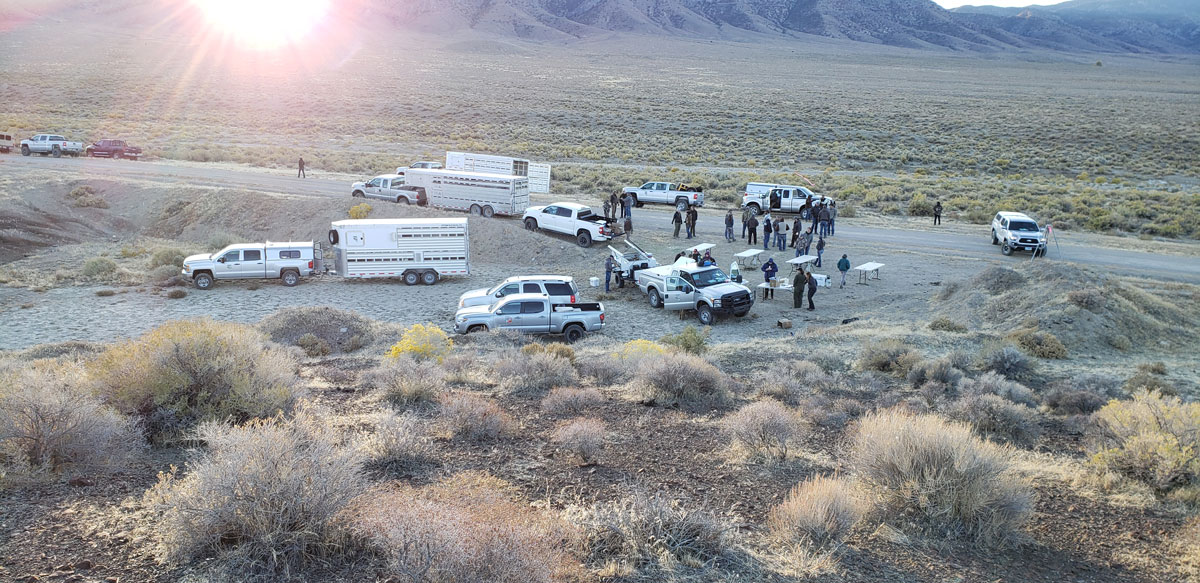
The goal was to have 50 sheep to reestablish bighorns in the Mineral Mountains. The first day was a little slow, only resulting in 15 sheep in the trailer, but when the work was over, 51 sheep had been transported. Even 25 or 30 sheep is enough to get a new herd off the ground.
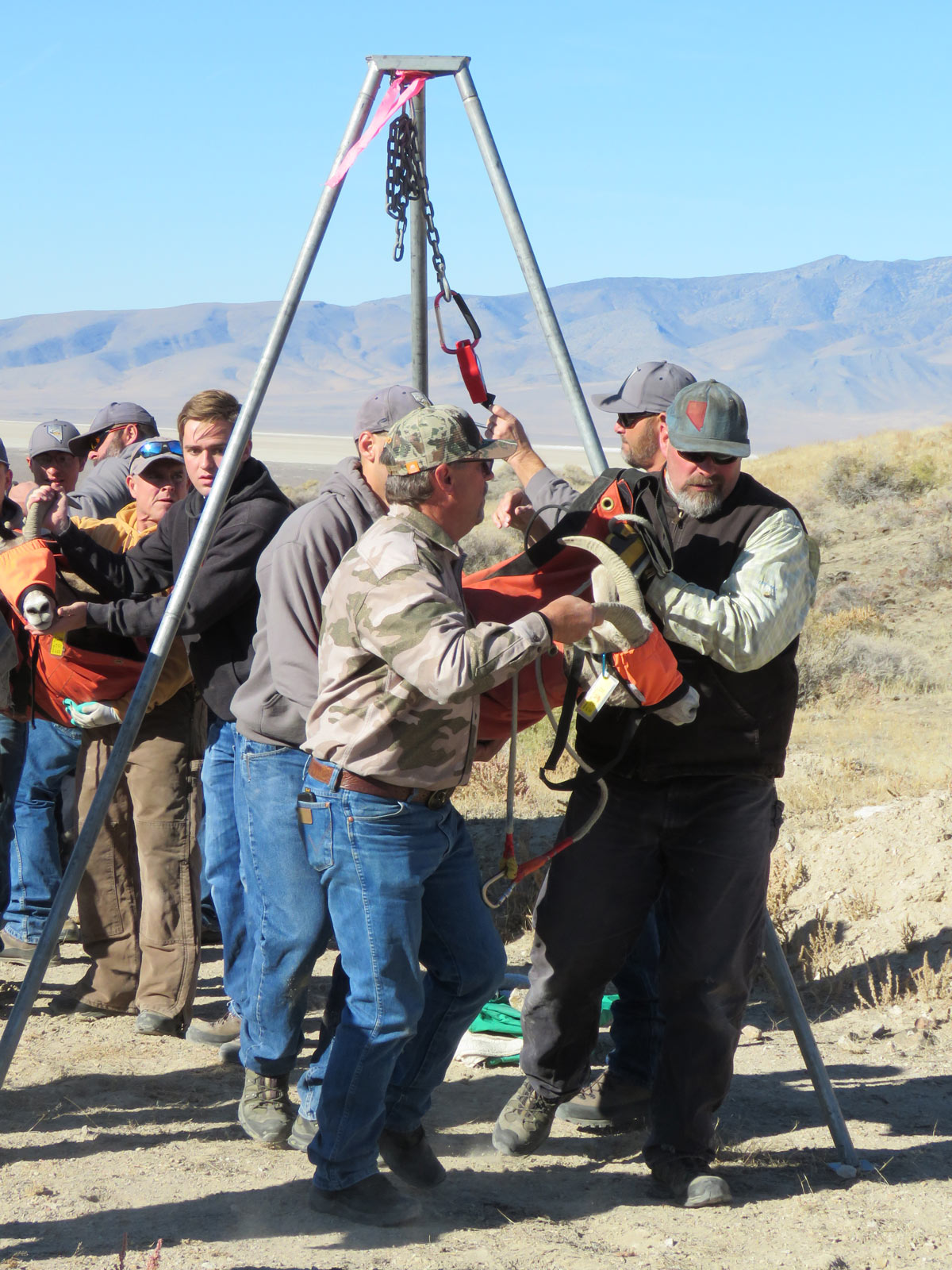
As you can see, it’s a very intensive process once the sheep are brought in. Wildlife biologists take a myriad of samples and administer injections. The animals’ temperatures are monitored constantly; if they rise too high, water, ice baths, and sometimes IVs are used to lower body temps and alleviate the related stresses.
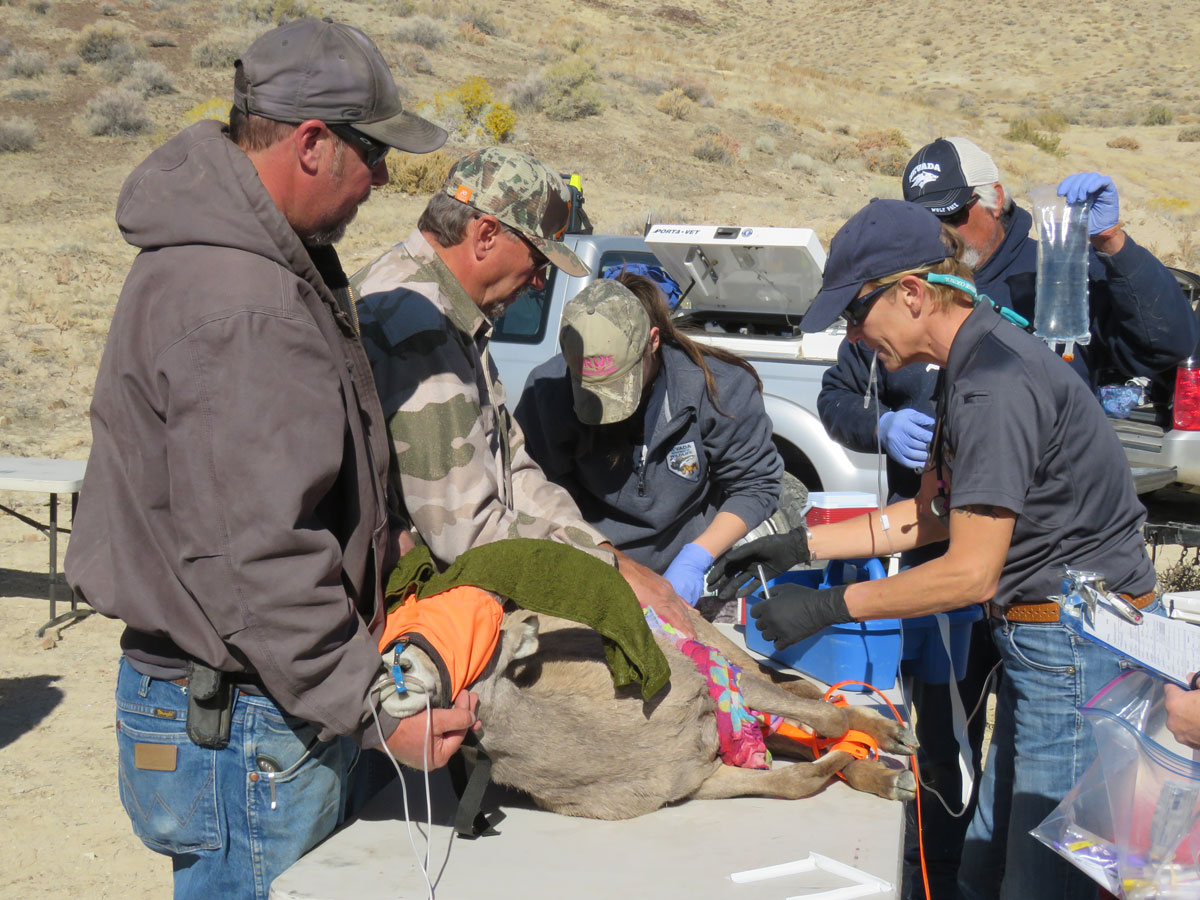
Before being loaded for transport, each sheep was fitted with a GPS collar that can be monitored remotely. These collars allow researchers and wildlife managers to monitor the health of the transplants and how they utilize their new habitat.
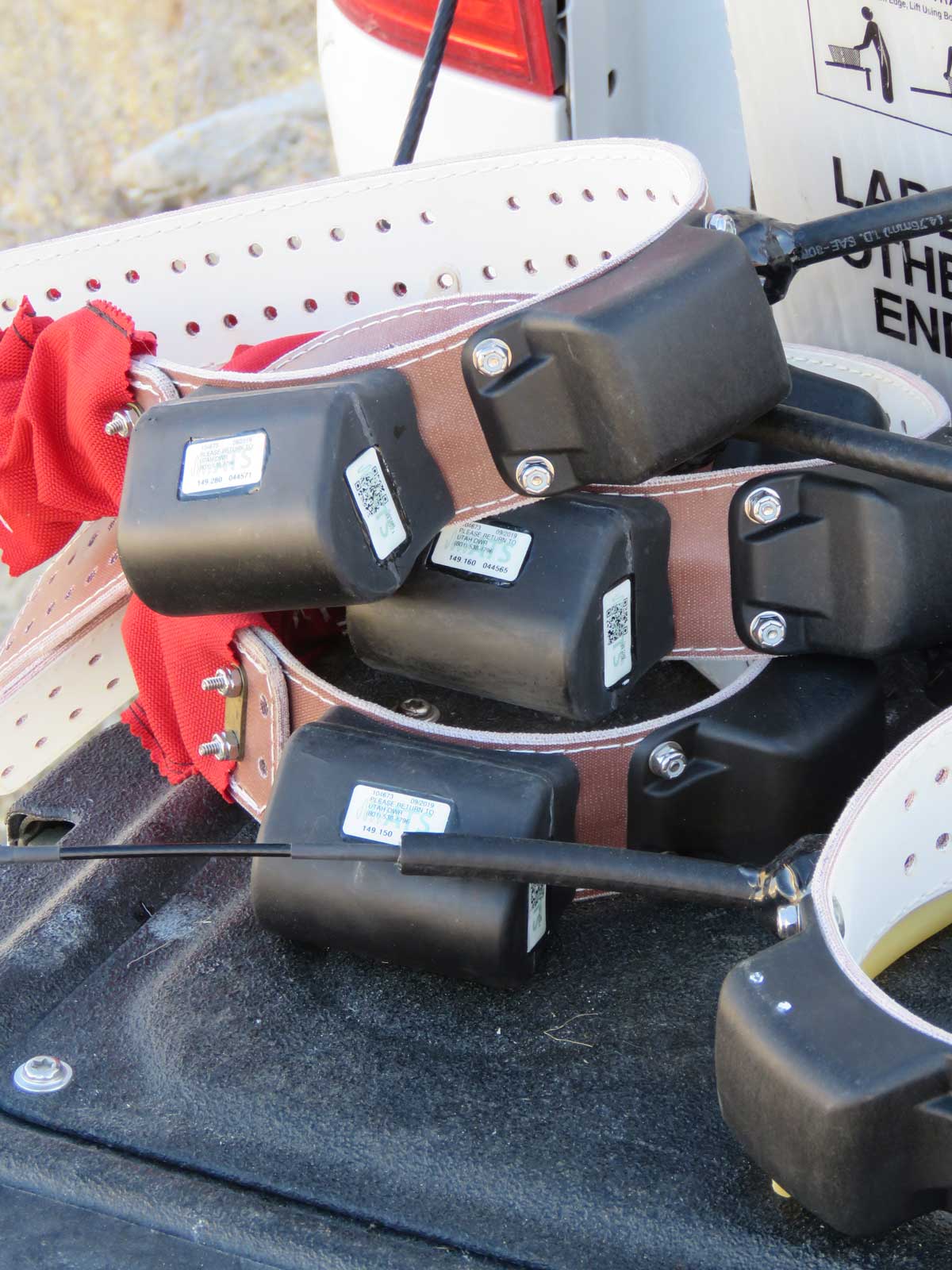
This project was delayed a day, because the capture crew was busy in Arizona capturing pronghorns and other bighorns for migration studies. The helicopter contractor, Quick Silver Air, out of Alaska, is one of the best in the business. I have been on numerous captures with them, and they are true professionals. It’s an extremely dangerous profession, and I shake my head in wonder every time I see it happen.
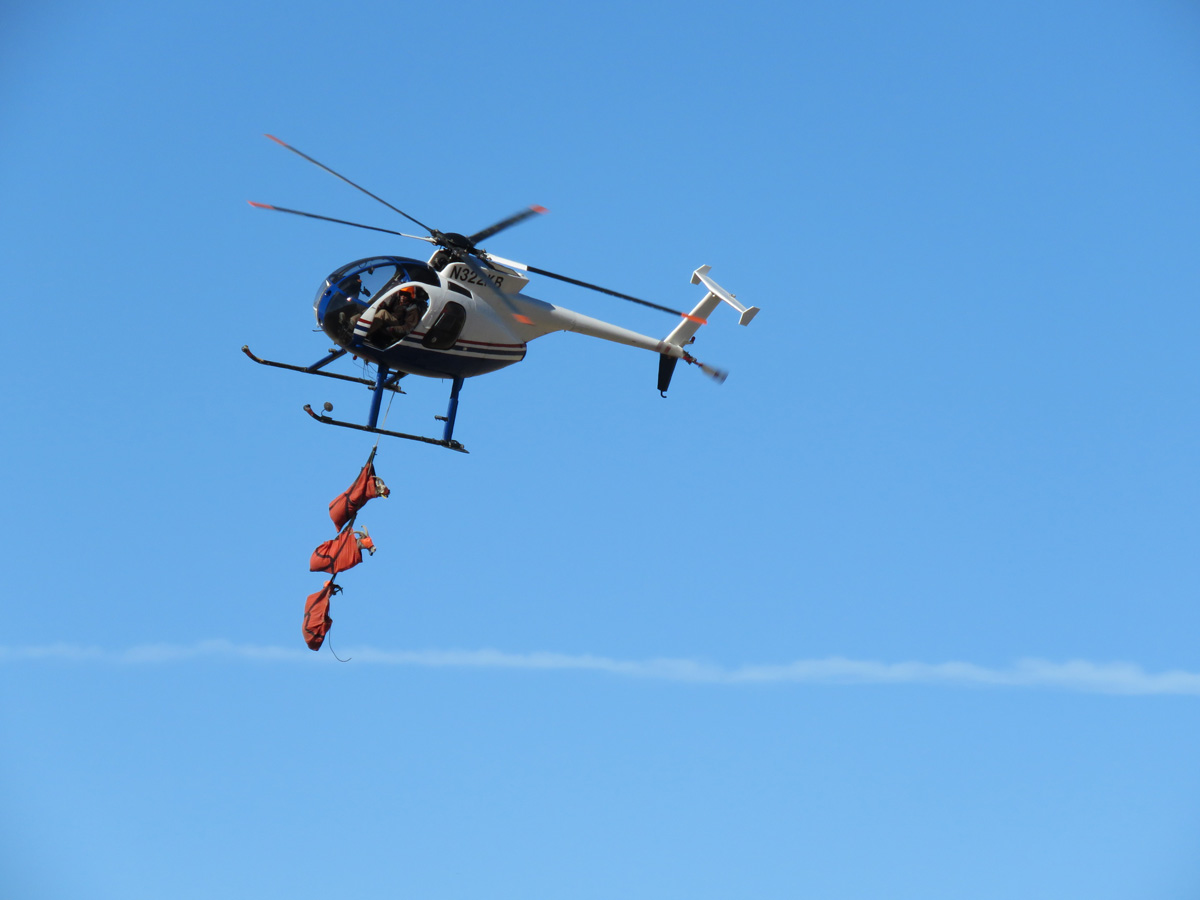
Most of the photo credits go to my hunting buddy, Patti Lingenfelter, who did a great job of documenting the efforts of all involved. In addition to being a lot of fun, these projects are always a learning experience for me, as well as a testament to the dedication of our wildlife professionals and conservationists of different backgrounds.
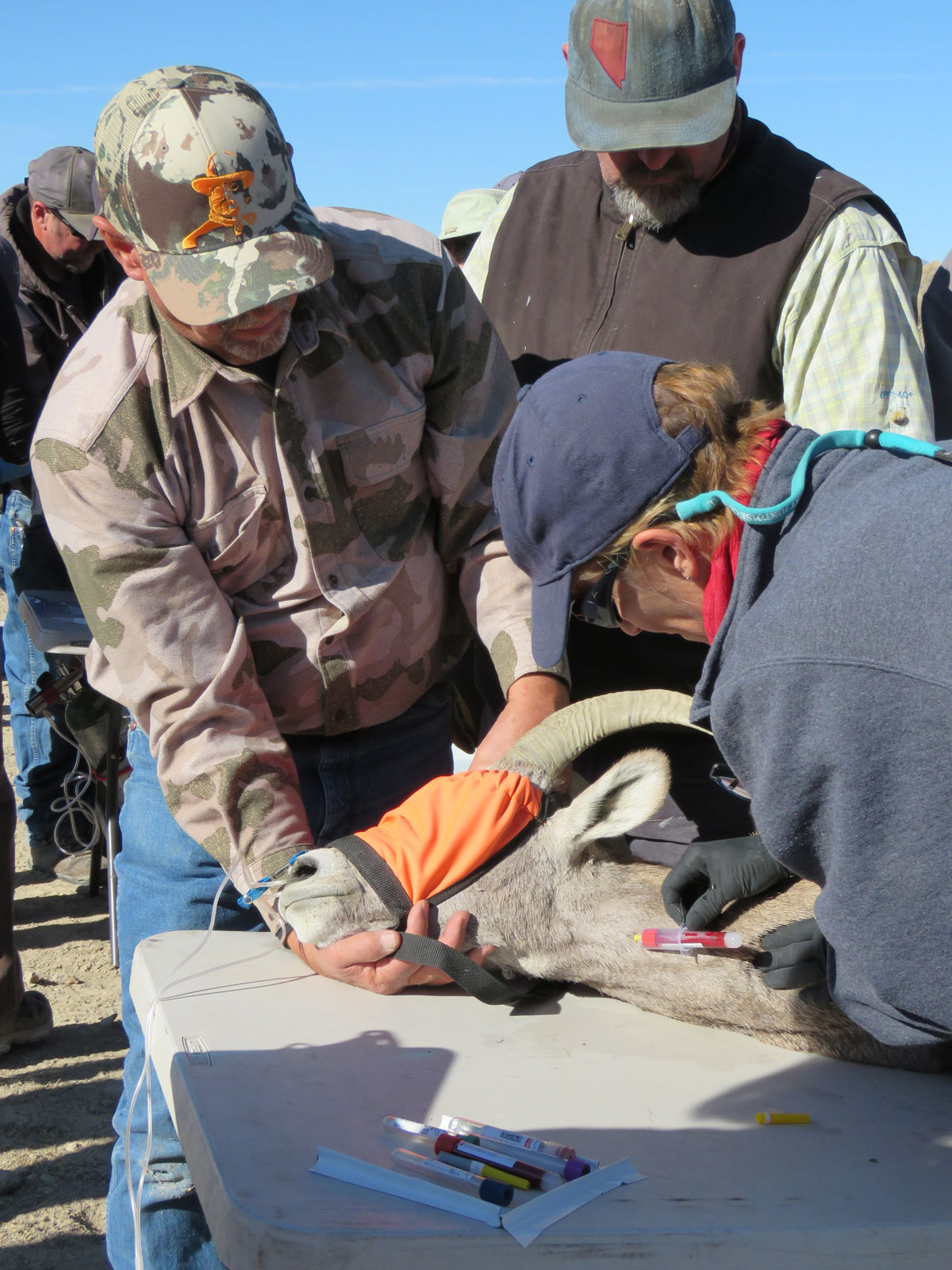
Sporting groups hail decision to preserve striped bass nursery
An interstate commission has responded to the industrial fishing giant Omega Protein’s violation of key menhaden catch limits in the Chesapeake Bay. The Atlantic States Marine Fisheries Commission (ASMFC) Menhaden Management Board unanimously voted this week to find Virginia’s menhaden reduction fishery out of compliance with the regional fishery management plan.
The Theodore Roosevelt Conservation Partnership, American Sportfishing Association, and Coastal Conservation Association all objected to Omega Protein’s fishing practices, which intentionally ignored the Commission’s 51,000-MT catch limit in the Chesapeake Bay. Omega previously made a commitment to comply with the limit, but last month announced it would exceed the cap.
“We commend the Board for holding Omega accountable and finding Virginia out of compliance with the management plan,” said Whit Fosburgh, president and CEO of the Theodore Roosevelt Conservation Association. “We are confident that the Secretary of Commerce will recognize the powerful economics of fishing for all species and not allow a single foreign company to set their own catch limits and jeopardize coastal economies that depend on sportfishing.”
“The Chesapeake Bay Harvest Cap is a wise management solution that conserves menhaden as critical forage for the Chesapeake Bay ecosystem while reducing conflicts between an industrial fishing fleet and the sportfishing community,” said Mike Waine, Atlantic fisheries policy director for the American Sportfishing Association. “Allowing Omega to make its own rules when harvesting America’s natural resources is not in the best interest of the nation’s sportfishing businesses and anglers.”
“It’s significant this was a unanimous vote of all Atlantic coast states to find Omega out of compliance,” said Richen Brame, Atlantic states fisheries director for the Coastal Conservation Association. “The vote included each state’s fishery agency director or their representative, all trained natural resource professionals, and they found Omega had crossed the line. We sincerely hope Secretary Ross agrees and does the right thing—close down menhaden harvest until they come into compliance.”
Research suggests industrial fishing of menhaden could be responsible for as much as a 30-percent decline in striped bass. A study determined the 2016 striped bass fishery generated $7.8 billion toward our nation’s gross domestic product.
The ASMFC Interstate Fisheries Management Program Policy Board and the full Commission will make a final decision on Virginia’s compliance with the Menhaden Management Plan on Thursday. Secretary of Commerce Wilbur Ross will then make a concurrence determination within 30 days. Should the Secretary side with the unanimous decision of the states on the Menhaden Management Board, then the fishery will be shut down until Virginia comes into compliance with the regional fishery management plan.
Omega Protein, a division of Canadian-owned Cooke Inc., is the only reduction fishing operation on the U.S. East coast. The company harvests more than 140,000 metric tons of fish per year, 74 percent of the total coastwide quota.
The full Commission will vote in 2020 on whether to implement an ecosystem-based management plan for menhaden. Learn more here.
We’re not the only ones who look to America’s conservation president for inspiration
While conservation and partnership are key to our mission, perhaps the most important part of the TRCP’s moniker is our namesake, the patron saint of conservation, public lands policy, and progress for fish and wildlife populations: Theodore Roosevelt. Most would agree that this bespectacled badass set us all up to succeed in safeguarding what makes the wildest parts of our country special. And he was well known for touting the value of spending time outdoors to heal, find solitude, and test one’s strength.
May we always follow his example.
For Theodore Roosevelt’s birthday on October 27, we collected thoughts from our staff, partners, members, and industry friends on what T.R. means to them. Enjoy!
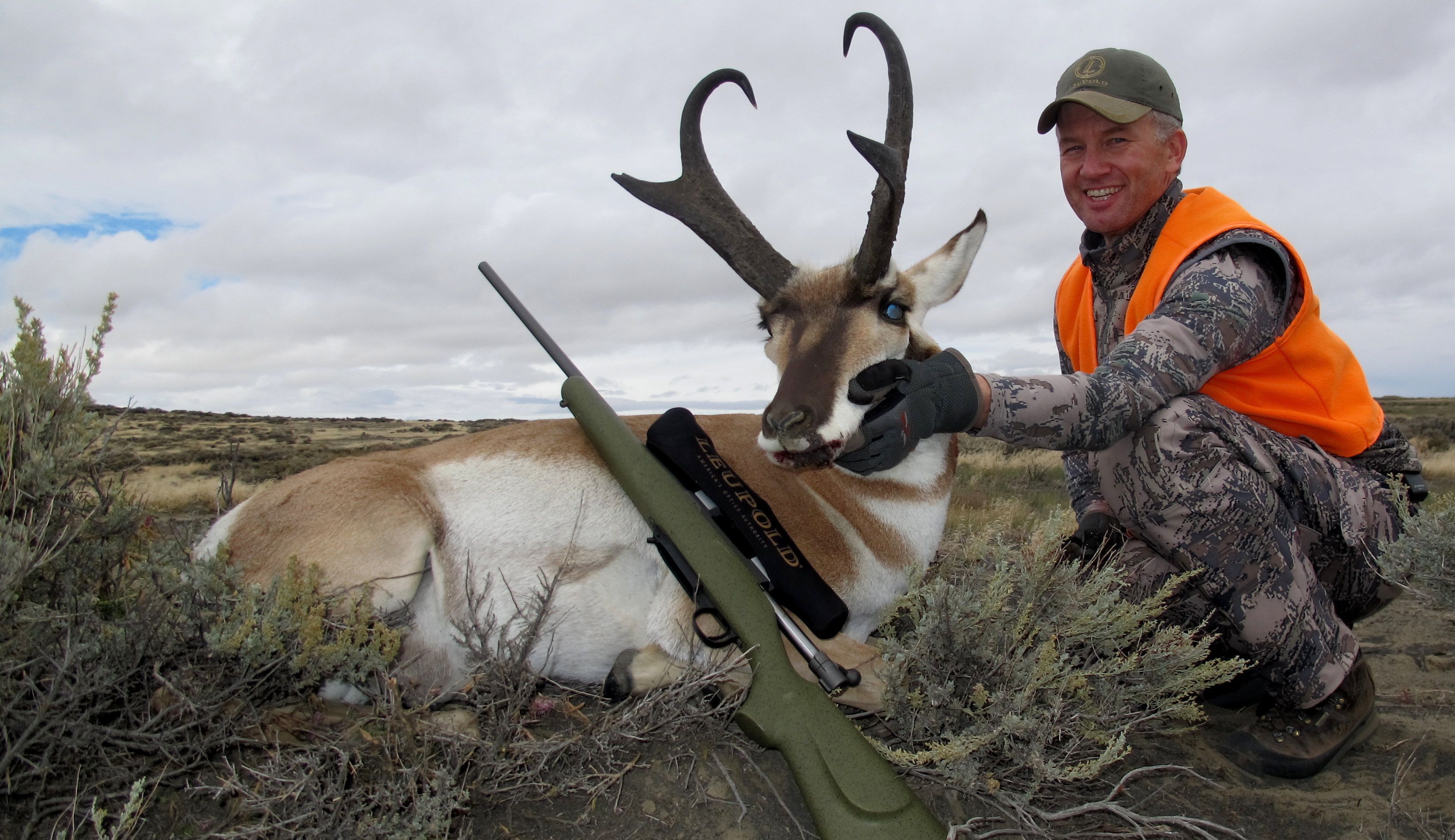
“My lesson taken from Roosevelt’s legacy is that conservation is always difficult, is always uncomfortable, and always inconvenient. Such was the case 115 years ago, and such is the case today; as it will always be.” — Randy Newberg, hunter and public lands advocate
“Theodore Roosevelt felt that all Americans should have the chance to prove themselves in the wild and enjoy the incredible natural resources that our forests, rivers, mountains, and prairies provide. His vision inspired the North American Model of Wildlife Conservation and his forward-thinking actions have made all of us richer in our ability to access public lands for recreation. We strive to honor his legacy by continuing to build upon his vision.” Whit Fosburgh, president and CEO of the Theodore Roosevelt Conservation Partnership
“Learning about T.R. in high school changed the course of my life. He inspired me to trust myself. Over the years, I have leaned on his words for strength—his ‘man in the arena’ speech taught me that failure was part of taking chances, but that it doesn’t define you.” — Christopher Hall, Talkeetna, Alaska
“These days, it’s easy to take for granted the things that Theodore Roosevelt fought so hard to establish, including opportunities to hunt and fish on public lands. Roosevelt’s birthday gives us an opportunity to reflect on the incredible vision for conservation and public lands that he instilled into the national conscience through sheer will and a determination to fight for future generations.” — Jared Mott, conservation director for the Izaak Walton League of America
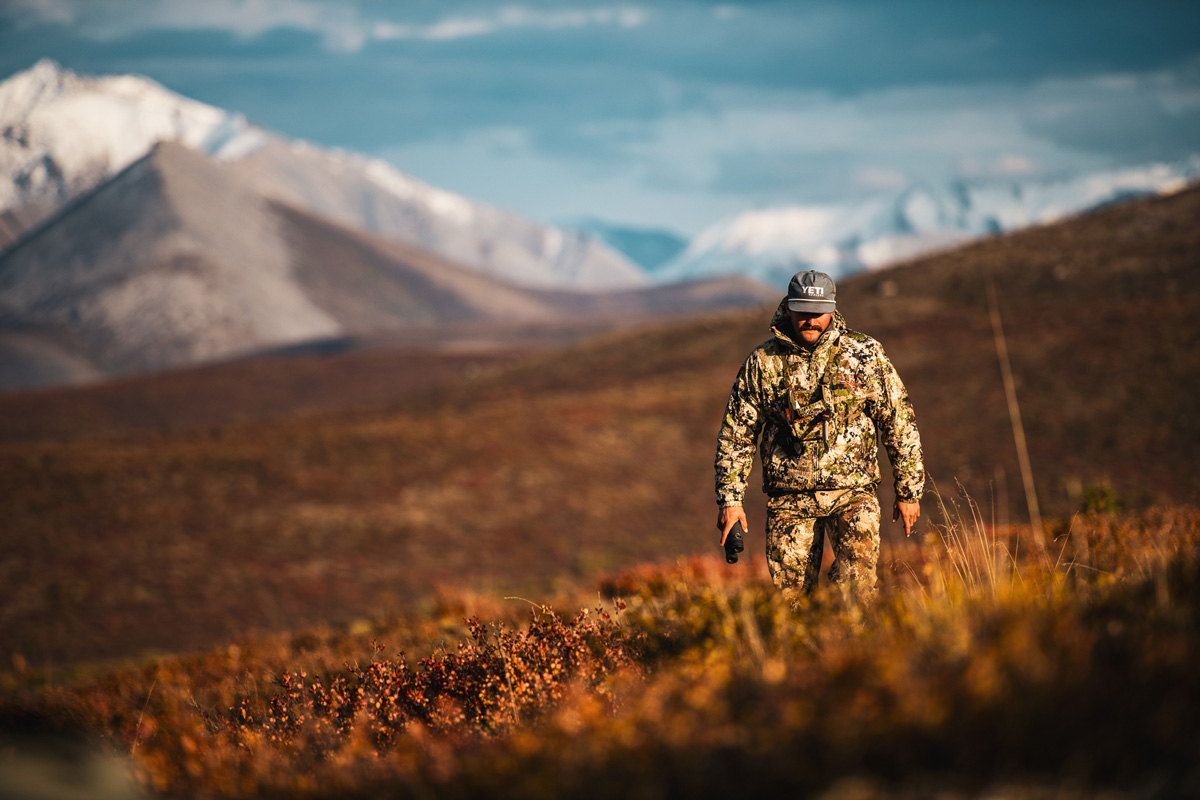
“Teddy Roosevelt inspired me to grow a mustache. However, I know it’ll never be as thick as T.R.’s, a man who protected 230 million acres of land for public use. I won’t stop trying, nor will I stop roaming and exploring the land he set aside for me. Thank you, Teddy!” — Sloane Brown, hunting expert at YETI
“I don’t think it’s widely known that Teddy Roosevelt grew up sickly in urban New York City. This may have been what drew him to the wonders of nature and to experience the healing powers of time spent outside. No matter what the activity—hiking, hunting, or fishing—Teddy treasured the beauty of the outdoors and dedicated himself to preserving these places for future generations. Let’s continue this legacy of protecting our public lands and waters and connecting people with the incredible economic, social, and health benefits of outdoor recreation.” — Jessica Wahl, executive director of the Outdoor Recreation Roundtable
“When I teach my students about the Progressive Era, I go above and beyond to stress the significant impact that T.R. made on this country, and particularly how he fought to change public perception of how our wildlife and other natural resources should be utilized. He not only championed our natural resources, but he significantly altered the president’s role in serving as the steward of our public resources. I hope that my teaching will help to pass on his legacy to future generations.” — Matthew Ryan, high school history teacher in Ohio
“For a man with all the means in the world at his disposal, T.R. took it upon himself to provide for all, not just the wealthy and privileged. He had ample opportunity to throw in the towel on his career with each milestone and accolade, but he kept going and fought with equal tenacity for causes both popular and unpopular, like the notions of public land and national forests open to all.” — Ryan Callaghan, conservation director for MeatEater
“The legacy of Theodore Roosevelt looms large in the mind of the avid angler as the result of our 26th president’s commitment to the conservation of public lands. His bold ideas and relentless pursuit to maintain the nation’s natural resources has created boundless opportunities for anglers to pursue one of America’s favorite pastimes. As we celebrate his 161st birthday, I am reminded of his efforts—as he would put it—’to work hard at work worth doing.’ All of us at ASA have worked hard and will continue to lead by his example to make sure public lands and waters remain open to foster the next generation of anglers.” — Glenn Hughes, president of the American Sportfishing Association
“Among the scores of conservation giants who have influenced our nation’s conservation history and ethic, critically few politicians make the list. POTUS Roosevelt truly stands out as one of America’s most stalwart and effective politicians advocating a pro-hunting and conservation-based idealism.” — Dan Forster, vice president and chief conservation officer of the Archery Trade Association

“Theodore Roosevelt’s legacy reminds me that when the world is too much, when I am hurting and need a reprieve, I can find the solace I need in the wilderness. He lost his wife and mother the very same day. That would break most people, and yet he retreated to the only place that could make him whole again, the open lands of the West, and came out of it a few years later a stronger, more determined man than ever. I never suffered a loss like his, but I suffered greatly for many years, and the countless hours spent in the woods, finally gaining some footing and developing as a hunter, have had the same end result for me. I am stronger, I am determined, and I will forge on.” — Cindy Stites, hunter and dedicated conservation volunteer in Indiana
“Every morning when I wake up, I try to ask myself, ‘What would Theodore Roosevelt do?’ If we all do that every day, our hunting and fishing opportunities and public lands legacy will be secure for future generations to ask that exact same question.” — Land Tawney, president and CEO of Backcountry Hunters and Anglers
“I am blessed to work along the Carolina coast managing the Theodore Roosevelt Natural Area. We have nearly 300 acres of old-growth maritime forest and estuarine habitat preserved in an area that has seen a tremendous amount of development over the past 50 years. Roosevelt’s dedication to conservation and land management is inspiring to so many of us, and his legacy will live on in the hearts of all who walk our trails and explore our shore.” — Wayne Justice, Pine Knoll Shores, North Carolina
“Theodore Roosevelt was an avid sportsman and hunter, and his devotion to conserving our natural and cultural history established a precedent for our nation. It is because of trailblazers like Teddy Roosevelt that we continue to have the privilege of investing in conservation to benefit both wildlife and people. He believed in cherishing our natural resources, not wasting them, and is remembered as a true pioneer of conservation.” — Adam Putnam, CEO of Ducks Unlimited
“I credit TR and his example with my decision to leave the real estate business and pursue land conservation in the West full time. I also credit T.R.’s ability to work harder than anyone, have plenty of irons in the fire, and embrace the strenuous life with inspiring me to start my own podcast, which highlights innovators of the American West, like ranchers, writers, conservationists, athletes, adventurers, and artists. It’s no exaggeration that, other than my family, TR has been the biggest influence on my life and career.” — Ed Roberson, Colorado Springs, Colo.
“President Roosevelt preached the virtues of hard work and commitment, knowing a passion for outdoor pursuits would sustain the nation into the future. 161 years later, fly fishermen are still supporting conservation every day, ensuring we have healthy water, habitat, and fisheries.” — Patrick Berry, president and CEO of Fly Fishers International
How does Theodore Roosevelt inspire you? Tell us in the comments.
Top photo courtesy of Harvard College Library. HOLLIS Image: Roosevelt Class No. 520.3, 560.3
Theodore Roosevelt’s experiences hunting and fishing certainly fueled his passion for conservation, but it seems that a passion for coffee may have powered his mornings. In fact, Roosevelt’s son once said that his father’s coffee cup was “more in the nature of a bathtub.” TRCP has partnered with Afuera Coffee Co. to bring together his two loves: a strong morning brew and a dedication to conservation. With your purchase, you’ll not only enjoy waking up to the rich aroma of this bolder roast—you’ll be supporting the important work of preserving hunting and fishing opportunities for all.
$4 from each bag is donated to the TRCP, to help continue their efforts of safeguarding critical habitats, productive hunting grounds, and favorite fishing holes for future generations.
Learn More
